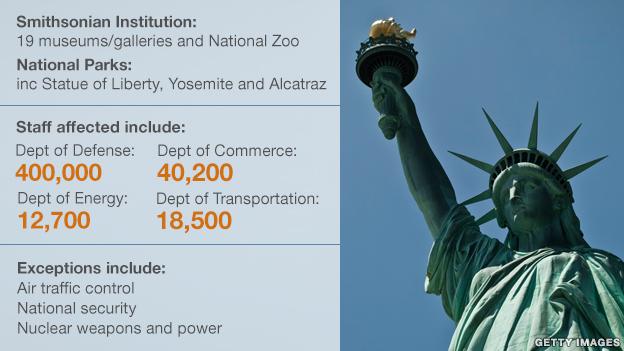US shutdown: White House talks fail to end deadlock
- Published
President Obama: "Absolutely I am exasperated because this is entirely unnecessary"
US President Obama and Congressional leaders have failed to break a budget deadlock that has led to a partial government shutdown.
Mr Obama held White House talks with Republican House Speaker John Boehner and Senate leader Mitch McConnell as well as their Democratic counterparts.
Mr Boehner left the talks complaining the Democrats "will not negotiate".
Mr Obama said he would not set a precedent where "an extremist wing" of a party holds a government to ransom.
He told CNBC ahead of the meeting that he was "prepared to negotiate on anything" over the budget once Congress passes "a clean piece of legislation that reopens the government".
John Boehner (Republican) and Nancy Pelosi (Democrat) both spoke after the talks
The US government closed non-essential operations on Tuesday after Congress failed to strike a deal on a new budget.
The shutdown has left more than 700,000 employees on unpaid leave and closed national parks, tourist sites, government websites, office buildings, and more.
However, as one budget crisis raged in Washington DC, another one - potentially more dangerous - looms in the coming weeks.
On 17 October, the US government will run out of cash to pay its bills unless the debt ceiling is raised.
'Locked in tight'
Mr Boehner emerged from Wednesday evening's talks at the White House, saying it had been a "polite conversation" but yielded nothing. Senate Republican leader Mitch McConnell called the talks "unproductive".
"All we're asking for here is a discussion and fairness for the American people under Obamacare,'' Mr Boehner told reporters.
House Minority Leader, Democrat Nancy Pelosi, who also attended the meeting, accused the Republicans of "moving the goalposts" on the budget deal.
Democratic Senate Majority Leader Harry Reid said his party were "locked in tight on Obamacare'' and neither the president nor Democrats in Congress would accept changes to the law as the price for a deal on reopening the government.
The Republicans who control the House of Representatives have demanded concessions from Mr Obama and his fellow Democrats in return for funding the government's continued operation and for raising the debt ceiling.
Chiefly, the Republicans demand the repeal, delay or defunding of a healthcare reform law - dubbed Obamacare - passed by the Democrats in 2010.
Major portions of that law, which was subsequently validated by the US Supreme Court and was a major issue in the 2012 presidential election, took effect on Tuesday.
Analysts say Mr Boehner could end the current government showdown by allowing the House to vote on a "clean" budget bill that does not alter the health law, because that could pass with a coalition of Democrats and moderate Republicans.
The view on the shutdown from deserted landmarks in Washington and New York
But doing so would risk his standing with the most conservative elements of his caucus.
Earlier on Wednesday, Mr Obama met the heads of some of Wall Street's biggest banks - including JPMorgan Chase, Goldman Sachs and Bank of America - to discuss the debt ceiling and other economic issues.
The bankers are members of the Financial Services Forum, a lobby group which has, along with 250 other businesses, sent a letter to Congress urging it to raise the debt limit by 17 October.
Following the meeting, Mr Obama told CNBC "it's important for them to recognise that this is going to have a profound impact on our economy and their bottom lines".
He said he was "exasperated" by events "because this is entirely unnecessary".
But he said bowing to the demands of any one faction set a dangerous precedent.
"If we get in the habit where a few folks, an extremist wing of one party... are allowed to extort concessions based on a threat of undermining the full faith and credit of the United States, then any president that comes after me... will find themselves unable to govern effectively," he said.
"And that is not something that I'm going to allow to happen."
